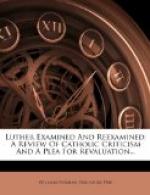We, too, would call this an act of despair. We would say with Luther: Despair makes monks. But the despair which we mean, and which Luther meant, is genuine spiritual despair. What Catholics call Luther’s despair is really desperation, a reckless, dare-devil plunging of a criminal into a splendid Catholic sanctuary. That Luther’s act decidedly was not. By Rome’s own teaching Luther belonged in the cloister. That mode of life was originally designed to meet the needs of just such minds as his. His entering the monastery was the logical sequence of his previous Catholic tutelage. Rome has this monk on its conscience, and a good many more besides.
As piety went in those days, Luther had been raised a pious young man. He was morally clean. He was a consistent, yea, a scrupulous member of his Church, regular in his daily devotions, reverencing every ordinance of the Church. Also during his student years he kept himself unspotted from the moral contaminations of the academic life. He abhorred the students who were devoted to King Gambrinus and Knight Tannhaeuser. He loathed the taverns and brothels of Erfurt. The Cotta home was no Bierstube in his day. The banquet-hall where he met his friends the evening before he entered the cloister was no banquet-hall in the modern sense of the term. That he played the lute at this farewell party, and that there were some “honorable maidens” present, is nowadays related with a wink of the eye by Catholics. But there was nothing wrong in all the proceedings of that evening. It was indeed an honorable gathering. Luther was never a prudish man or fanatic. He loved the decent joys and pleasures of life. Luther gathered his friends about him to take a decent leave of them. He did not run away from them secretly, as many monks have done. He opened up his mind to them at this last meeting. The conversation that ensued was a test of the strength of the convictions he had formed. His was an introspective nature. He had wrestled daily with the sin that ever besets us. He knew that with all his conventional religiousness he could




